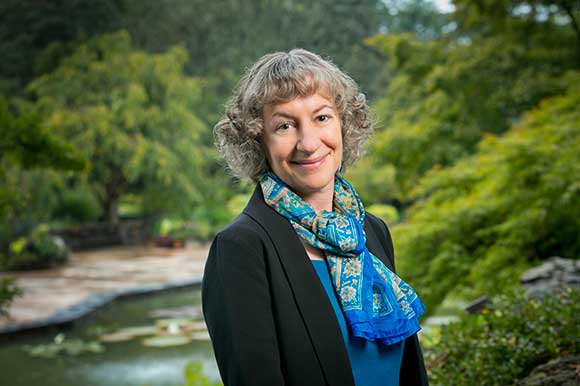
New Academic Council Chair Nan Jokerst will lead faculty through a series of challenging discussions this year. Photo by Les Todd/Duke Photography
With a new strategic plan in the works, and in-depth discussions on faculty diversity and salary equity underway, new Academic Council chair Nan Jokerst is already looking at a full calendar this academic year.
But the professor of electrical and computing engineering said she doesn’t mind being busy, as long as a process is in place that allows faculty to have their voice heard in a timely and influential way.
“Process is going to be an emphasis,” said Jokerst, who succeeds Josh Socolar in a two-year term as council chair. “I think the faculty partnership with the administration has been great, but we’re going to make sure that at the beginning of the year we will have a discussion of the approach and process on these major issues and then at the end of the year we can talk about outcomes. We’re not just going to vote on a policy in the end.”
The first example came this past week during the council’s discussion on the undergraduate education program at Duke Kunshan University. Although held behind closed doors in executive session, Jokerst said the meeting focused on developing the undergraduate curriculum. Faculty will be involved throughout, she said, before a final vote on the program.
“Right now the relationship with DKU is limited to a small number of graduate degrees,” said Jokerst. “For my part, if we have an undergraduate degree, I want faculty here is to really engage with the pedagogy. One factor is quality. If we have the Duke name anywhere on the degree there, the curriculum has to be of Duke quality.”
Here is a rundown of some of the topics on future agendas, according to Jokerst:
Strategic Plan
At Duke, strategic plans aren’t vacant exercises. The last strategic plan, 2006’s “Making a Difference,” guided new investments in programmatic initiatives and interdisciplinary institutes such as Duke Engage and the Duke Global Health Initiative.
Jokerst said strong faculty involvement will ensure the new plan has the same effective influence. Nicholas Professor Susan Lozier, chair of the Strategic Plan Steering Committee, will update the council on the first phase of the plan on Oct. 22.
Master’s Degrees
Following two years of council discussions about the increasing number of new master’s degree programs, the council received a report last year from Graduate School Dean Paula McClain that explores the causes and effects of the program growth. One key finding is that many of the new programs were happening in the professional schools outside the purview of the Graduate School.
The review will continue this year, with one focus being on the role of the Master’s Advisory Council (MAC), which reports to the provost, advises schools on new programs and monitors existing master’s programs.
“There’s a growing realization that there isn’t one central entity overseeing master’s degrees,” Jokerst said. “A lot of the decisions have devolved to the schools. Therefore, understanding the roles and responsibilities of the MAC is extremely important.”
Many of the new degree programs match exciting new research areas of faculty, but Jokerst said faculty have to consider more than the overall merits of the individual programs. “It’s also important to understand how all these programs affect the overall university ecosystem. These aren’t simple questions. The faculty want to have a lot of input on these discussion, and I think we’ll find the input to be rather mixed.”
Diversity and Inclusion
After a 14-month study, a faculty committee co-chaired by Jokerst last semester recommended significant organizational changes to address faculty diversity and inclusion, with the goal of “improving demographic diversity, but also to develop a culture of inclusion.”
This semester the focus will be on an implementation committee chaired by Nicholas Professor Emily Klein that will review each of the recommendations. Jokerst said she is “already seeing positive results,” including development of school and department diversity committees and a successful year in attracting underrepresented minorities to the faculty.
“Recently a new faculty member came up to me and asked if I was the co-chair of the diversity report. Then she added that one of the reasons she came to Duke was that we did that report and published it online where she could read it. I think it’s going to make a difference.”
Salary Equity
Although the council received the regular biennial report on faculty salary equity last year, faculty will return to the data this year to better understand the report’s findings, which differed from a Chronicle of Higher Education study that indicated significant gender inequities in Duke faculty salaries.
The review will be led by Merlise Clyde, professor of statistics who was a member of the salary equity committee last year.
“The Chronicle study was pretty simple; it took the raw data, separated male and female salaries and found the average,” Jokerst said. “The Duke faculty equity study was more sophisticated, but still it’s disturbing our study found no gender imbalance and all of the sudden the Chronicle says, ‘Here it is,’ We need a deeper dive into the data, and Merlise is the right person to lead that.”
Ombudsman Position and the Faculty Handbook:
Faculty conflicts will occur, but in several recent cases a lack of clarity about the role of the faculty ombudsman position appears to have made it harder to resolve them. In brief, there is confusion about whether the role is meant to serve as a mediator or a faculty advocate. Last year, a review of the faculty ombudsman position noted numerous weaknesses in the description of the role in Appendix N of the Faculty Handbook.
“Appendix N is not well written,” Jokerst said. “The committee last year did an excellent report. Now we need to translate what they came up with and rewrite Appendix N to provide clear guidance both for the ombudsman and for the faculty as to the roles and responsibilities of the position.”